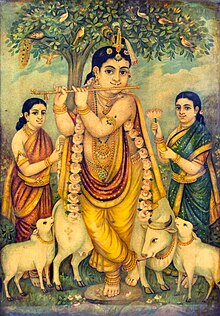| Dvadasha Stotra | |
|---|---|
 Painting of Krishna with consorts Rukmini and Satyabhama, Ravi Varma Press Painting of Krishna with consorts Rukmini and Satyabhama, Ravi Varma Press | |
| Information | |
| Religion | Hinduism |
| Author | Madhvacharya |
| Language | Sanskrit |
| Period | 13th century |
| Verses | 12 |
The Dvadasha Stotra (Sanskrit: द्वादशस्तोत्रम्, romanized: Dvādaśastotraṃ) is a series of 12 stotras, or religious hymns, composed by Madhvacharya, the 13th-century founder of the Dvaita school of Indian philosophy. Dvadaśa in Sanskrit means "twelve", and all the 12 stotras are in praise of the Hindu god Vishnu. The third stotra is considered a summary of Madhvacharya's philosophy.
It is believed that the stotras were composed in connection with the installation of the idol of the Hindu god Krishna at Udupi.
There have been numerous musical compositions of the Dvadasha Stotra over the years. It is also a ritual to recite the Dvadasha Stotra at the time of naivedya or the offering of food to God performed at Madhva temples.
Hymn
The first verse of the stotra is as follows:
vande vandyam sadanandam
— Verse 1
vasudevam niranjanam
indirdpatimadyadi
varadesavarapradam
I reverentially salute Vasudeva the adorable, of the nature of impeccable bliss, immaculate, the Lord of Indra and the bestower of boons on boon-giving lords such as Brahma and others.
Commentaries and translations
There are eight known commentaries on the Dvadasha Stotra, authored by:
- Gangodamishra
- Gudhakartrika
- Chalari Narasimhacharya
- Channapattana Thimmannacharya
- Umarji Tirumalacharya
- C M Padmanabhacharya
- Punyashravana Bhikshu
- Sri Vishwapati Tîrtha
See also
References
- Edwin F. Bryant (18 June 2007). Krishna: A Sourcebook. Oxford University Press. p. 358. ISBN 978-0-19-972431-4. Retrieved 18 June 2007.
- "Dvaadasha Stotra". Archived from the original on 2020-08-09. Retrieved 2007-12-21.
- Journal of Indian Council of Philosophical Research, Volume 19. Indian Council of Philosophical Research. 2002. p. 147.
- Sharma, B. N. Krishnamurti (2000). History of the Dvaita School of Vedānta and Its Literature: From the Earliest Beginnings to Our Own Times. Motilal Banarsidass Publ. p. 187. ISBN 978-81-208-1575-9.
- "Occasions for the Dvadasha Stotra's recitation". Archived from the original on 2020-08-09. Retrieved 2007-12-21.
- Makarand Joshi. Dvadasa Stotram Of Sri Madhvacharya English Translation By Kowlagi Seshachar. p. 1.
- "Commentaries on the Dvadasha Stotra". Archived from the original on 2020-08-09. Retrieved 2008-06-26.
External links
- Transliteration of the Dvadasha Stotras in Roman alphabets
- Vishwapati Tirtha vyakhyana on Dvadasha Stotra with Kannada Anuvada by Dr. Vyasanakakere Prabhanjanacharya